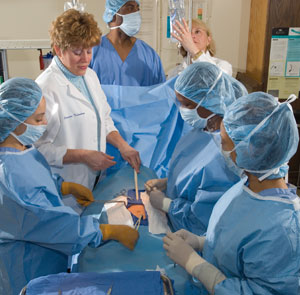Surgical Technology Program
 SHARPEN YOUR SKILLS.
SHARPEN YOUR SKILLS.
Nassau’s Surgical Technology program is one of our most popular programs — for good reason. Not only are surgical technologists in high demand, but our program has a nearly 50-year history and an outstanding reputation for producing graduates who are well prepared. Beginning in 2013, the program has annually received the National Merit Award from the National Board of Surgical Technology and Surgical Assisting (NBSTSA) for achieving a 90% graduate pass rate on the Certified Surgical Technologist (CST) examination. Graduates demonstrate by examination an understanding of the basic competencies for safe patient care in the operating room. The CST is widely recognized in the health care community as the foremost credential for surgical technologists in the nation and required for employment in NYS.
Our two-year Associate's Degree in Applied Science in Surgical Technology (AAS) is distinctive to Long Island. It is the ONLY Associate Degree program on Long Island accredited by The Commission on Accreditation of Allied Health Education Programs (CAAHEP) upon recommendation from The Accreditation Review Council on Education in Surgical Technology and Surgical Assisting (ARCSTSA). As a graduate, you'll be required to sit for the (NBSTSA) National Board of Surgical Technology and Surgical Assisting Certification Exam in Surgical Technology (CST). You can begin your career immediately after graduation
STATE LAW OVERVIEW as it relates to National Certification for the CST
The following states have passed law related to the education and certification of surgical technologists.
- Connecticut (2023)
- Idaho (1991)
- Indiana (2009)
- Massachusetts (2012)
- Nevada (2017)
- New Jersey (2011)
- New York (2015)
- Oregon (2016)
- Pennsylvania (2020)
- South Carolina (2018)
- Tennessee (2006)
- Texas (2009)
- Virfinia (2021)
Laws related to registration:
- Arkansas (2017)
- Colorado (2016) (CST not required for registration)
- Illionois (2013)
- North Dakota (2019)
- Washington (2010)
Most recent information related to National Certification for the CST can be found at: https://www.ast.org/Public_Policy/Legislative_Overview
INTERVIEWS ARE SCHEDULED BY APPOINTMENT ONLY
PROGRAM HIGHLIGHTS
You’ll benefit from:
- Cutting-edge medical equipment, including an anesthesia machine, an adult lung simulator, laparoscopic simulation trainer sets, "SimMan," a virtual reality mannequin, and two mock operating rooms
- Laboratory work that begins your first year
- Clinical experience at accredited hospitals in your first and second year
- A minimum of 120 real-life clinical cases by the time you graduate
- A rich network of exceptional alumni
Program Effectiveness Learning Outcomes Trends Data:
- Five-Year Average Program Completion Rate: 85%
- Five-Year Average Job Placement Rate: 98%
- Five-Year Average Employer Satisfaction Rate: 100%
- Five-Year Average Graduate Satisfaction Rate: 99%
- The Current Pass Rate for the Class of 2024, CST Exam 81%
YOUR FUTURE
The future is extremely bright for our Surgical Technology graduates. According to the United States Department of Labor, Bureau of Labor Statistics, the demand for surgical technologists is expected to increase as the population ages and the number of surgical procedures grows. In fact, the employment rate of surgical technologists nationwide is expected to grow faster than the average of all occupations.
You will also be prepared to continue your education and further specialize in surgical technology or pursue a career as a:
- Registered Nurse (RN), Certified Registered Nurse Anesthetist (CRNA)
- Perfusionist
- Physician Assistant (PA)
- Physician

